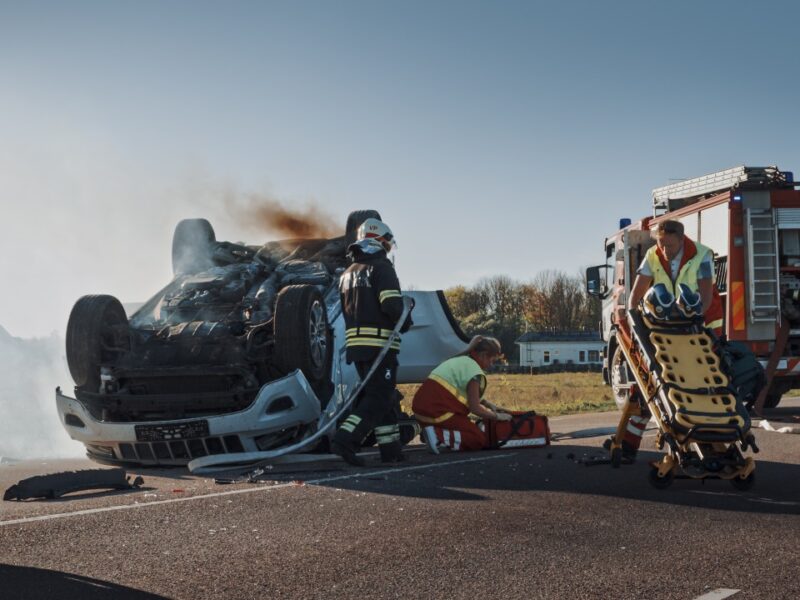Award-Winning Counsel: The Hassell Law Group’s 11 Important Steps To Take After a California Collision
What should I do after a California Car Accident?
Car accidents are unexpected and distressing events that can leave you seriously injured, feeling overwhelmed, and uncertain about what to do next. Your safety and physical well-being, as well as that of other parties involved in the accident, should be your top priority immediately after a car accident. In the aftermath of a car accident, taking the right steps can help you recover from your injuries, protect your rights, and ensure you receive the appropriate compensation for your injuries. In this article, we outline the 11 key steps to take after you have been in a California car accident.
1. Check for Injuries and Call for Medical Help
Before anything else, check yourself and any of your passengers for injuries. If anyone involved in the accident is injured, call 911 for emergency medical help immediately. Even if there are no apparent injuries, you must seek a prompt medical evaluation after the car accident as some injuries sustained may not be immediately noticeable. Symptoms of certain accident-related injuries such as whiplash and traumatic brain injuries can take hours or even days to first appear. Remember, your health and well-being are paramount. Seek an immediate medical evaluation at your nearest hospital emergency room to document any symptoms and treat any injuries you may have sustained due to the accident. This is very important especially if you’d like to make a personal injury claim against the other driver, as their insurer will require proof that you were injured, and medical documentation is what they need.
2. Move to Safety
If possible and if your injuries are not severe, move your vehicle to a safe location away from traffic. This helps prevent further accidents and ensures the safety of everyone involved. Turn on your hazard lights to alert other drivers to slow down.
3. Contact the Police
Regardless of the accident’s severity, it’s crucial to contact the police and file an accident report and do so immediately after or as soon thereafter as possible. The police report will serve as valuable documentation for insurance claims and any future legal proceedings that may arise. If you did not make a police report at the scene, go down to your local police department, or to your local CHP office if it was a highway collision, and make an over-the-counter report. Provide all of the information you are aware of and have about the other driver, injuries, insurance, witnesses, etc. Insurance companies in some instances may require a police report.
4. Gather Information
Exchange information with the other parties involved in the accident. Obtain their names, contact details, driver’s license numbers, license plate numbers, insurance information, and vehicle descriptions. Also, be sure to collect contact information from any witnesses present at the scene as they can prove crucial at a later point if the other driver tries to shift blame or change the facts of how the accident happened.
5. Document the Accident Scene
If it is safe to do so, take extensive photographs of the accident scene, including the vehicles’ positions, damage to the vehicles, road conditions, traffic signs, and any visible injuries you or your passengers may have. Photos provide crucial evidence during the insurance claims process or potential future litigation.
6. Do Not Admit Fault
Avoid discussing who you feel was at fault for the accident with the other parties or witnesses. But make note of any statements they make about who they believe was at fault and why. Car accident fault can get rather complex and when it is disputed and the parties cannot come to an agreement, it can then only be decided by a judge or jury. Even if you believe you may have been partially responsible, avoid making any statements that could be misconstrued or be viewed as admitting any or all of the fault. Leave that investigation and determination of fault to the Police, your personal injury lawyer, and the involved insurance companies.
7. Seek Legal Advice from An Experienced Personal Injury Lawyer
If you sustained any significant injuries or believe the other driver was at fault, it is important to consult with a skilled personal injury lawyer immediately after you are first evaluated and seen at the hospital. An experienced personal injury lawyer will know and be able to assert all of your rights, navigate the legal complexities of your claim, and negotiate with insurance companies on your behalf and ensure you receive the financial compensation you are entitled to for your injuries.
8. Notify Your Insurance Company
Contact your insurance company as soon as possible to report the accident. Provide them with the necessary details and be accurate in your account of the events. They will guide you through getting the claims process started. It is important to note that you should not provide a recorded or written statement to any insurance company, even your own, without your personal injury lawyer first agreeing to it and being present for any statement you give. You are not legally obligated to give a recorded statement without having a lawyer present and you should not do so.
9. Preserve Evidence
Keep all documents related to the accident, such as photos of the vehicles, accident scene and injuries, medical records, handwritten notes, police reports, vehicle repair estimates, and correspondence with insurance companies. These records will be essential in supporting your insurance claim or in the event any potential litigation that may arise.
10. Follow Medical Advice and Treatment
If you seek medical attention for your injuries, and you should do so, be sure to follow through with all prescribed treatments and attend all follow-up medical appointments. Your health and recovery are vital, and your commitment to seeking follow-up medical care will also strengthen your personal injury claim and its value. Failure to seek medical treatment soon after the accident and then continue with it consistently until your injuries are resolved will reduce the value of your claim of injury.
11. Avoid Discussing the Accident Publicly
Refrain from discussing or posting any information about the accident on social media or any other public platform. Insurance companies and opposing legal teams may monitor your online presence to gather evidence that could be used against you and misconstrued. Do not discuss the accident with anyone other than your personal injury lawyer. Refrain from communicating with the opposing driver as its best to consult your lawyer before engaging in communications.
Remember, each car accident is unique, and the aftermath can be very challenging to handle alone especially while trying to recover from injuries, deal with a damaged car, and lacking specialized knowledge of insurance and injury law. There are a multitude of issues that come into play, including insurance adjusters trying to avoid paying your claim or paying much less, not knowing the ins and outs of insurance coverages and how and when they apply, dealing with medical bills seeking payment, and more. Seeking the guidance of an experienced personal injury lawyer is in your best interest and ensures that your rights are asserted and is your best option to ensure you are fully and fairly compensated.
We offer California Car Accident Victims a Free Consultation, and there are No Attorney’s Fees Unless We Recover Compensation For You
At The Hassell Law Group, our legal team are experts in car accident law and personal injury law with over 100 years of combined legal experience, and experience matters. We stand up to aggressive insurance companies and have a history of obtaining award-winning results for our clients. We fight every step of the way to achieve the best possible outcome for our car accident clients. We work on a contingency fee basis, which means there is no risk in hiring our law firm.
Contact us today to schedule a free consultation and case evaluation. We welcome your questions, and our legal team looks forward to helping you obtain just and proper compensation for your personal injury claim.
Read next: How an attorney can help with your car accident claim
The general information provided on this website should not be considered legal advice and does not constitute legal advice. For legal advice, you should consult directly with an attorney. If you contact us by telephone, email, letter, or by contact form submission through this website, please note that such communication does not create or constitute an attorney-client relationship. We cannot act as your attorney until we are hired as your attorney by a formal written agreement.


 The Hassell Law Group Ranked Best Personal Injury Firm
The Hassell Law Group Ranked Best Personal Injury Firm